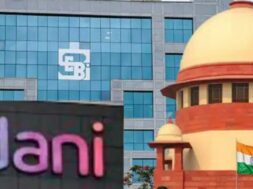
Adani Group: Probing into Hindenburg allegations, SEBI tells SC
Virendra Pandit
New Delhi: The Securities and Exchange Board of India (SEBI) has informed the Supreme Court that it is inquiring into the allegations made by Hindenburg Research against the Adani Group, as well as the market activity immediately preceding and after the publication of the US-based short-sellers January 24 report to identify any violations of its regulations.
The top court is scheduled to hear the two PILs alleging exploitation of innocent investors and “artificial crashing” of the Adani Group’s stock value on February 17 when it will consider setting up a panel to consider strengthening the regulatory framework.
The SEBI also said as the matter was in the early stages of examination, it may not be appropriate to list details about the ongoing proceedings at this stage.
While listing out available legal and other frameworks to deal with any wrong-doings in the securities market, SEBI said it has a robust set of frameworks and market systems to ensure seamless trading, settlement and dealing with the volatility in stock exchanges, and restrictions on short selling, including by foreign institutions.
Besides, it asserted that developed securities markets across the world recognize short selling as a legitimate investment activity, the media reported on Tuesday.
The SEBI, in its 23-page note submitted to a Supreme Court Bench headed by Chief Justice DY Chandrachud, which is hearing the two PILs relating to the recent Adani Group shares crash, said it was already enquiring into the Hindenburg allegations and the market activity immediately preceding and after the publication of the report, to identify any violations of the SEBI Regulations and short selling norms.
Observing that the recent impact on the securities market because of the Adani Group shares crash did not have a significant impact, the regulator said, Indian markets have seen far higher turbulent times in the past, especially during the Covid pandemic period, when Nifty fell by around 26 percent between March 2 and 19, 2020 (13 trading days). In light of this heightened market volatility, SEBI, on March 20, 2020, reviewed its existing market mechanisms and introduced a few changes.
It gave the details as to what constitutes short selling and said India follows the policy of regulated short selling and has framed its regime accordingly.
Short selling usually involves investors borrowing shares and selling them, expecting to buy them back later at a lower price before returning them to the lenders and making profits on the difference between the higher sale price initially and the lower purchase price subsequently, it said.
Securities market regulators in most countries, and, in particular, in developed securities markets, recognize short selling as a legitimate investment activity. Such jurisdictions also have an active market for equity derivatives, including stock futures.
“Thus, in all major jurisdictions, instead of prohibiting short sales per se the regulators have permitted it to take place within a regulated framework. The International Organisation of Securities Commissions (IOSCO) has also reviewed short selling and securities lending practices across markets and recommended transparency of short selling, rather than prohibiting it, it said.
Referring to the facts of the recent events, the regulator said that Hindenburg is one of the short seller research companies in the US that research companies they believe have governance and/or financial issues.
Their strategy is to take a short position in the bonds/shares of such companies at the prevailing prices, (i.e., sell the bonds/shares without actually holding them) and then publish their reports. If the markets believe the reports, the prices of the bonds/shares start to fall. Once the fall starts, other institutions who have ‘stop-loss limits’, also start selling their holdings of bonds/shares irrespective of whether they believe in the report or not, thus triggering a downward spiral in the bond/share prices.
The short sellers then buy the shares/bonds at lower prices, thus making a profit. The more the market believes their reports, and the more that ‘stop loss limits’ get triggered, the more the prices of the bonds/shares fall and the more money they make, it said.
On Adani firms, it said the Indian group has a number of USD-denominated bonds listed in the overseas market and the Hindenburg in its report has stated that its short positions in the group are in USD bonds in overseas markets and non-Indian traded derivatives.
The events that are the subject of the PIL are related to one set of entities in the market and have not had any significant impact at the systemic level. While the shares of the group have seen a considerable decline in prices on account of selling pressure, the wider Indian market has shown full resilience. The combined weight of the Adani Group companies in Sensex is zero and in Nifty is below 1 percent, it said.
Even during such turbulent times, despite demands to ban, SEBI did not resort to banning short selling, it said, and added that markets continued to function in a robust manner, recovering far faster than other global markets’ investor wealth.
The market capitalization of all listed companies which was around Rs 145 lakh crore in February 2020 has almost doubled to about Rs 270 lakh crore now. Further, overall market volatility in India is on par or lower than in major developed markets, it said.
The PILs relate to events that are localized to a single group of companies and there is no significant impact at a market-wide level, it said.
The SEBI’s note said the issue had a significant impact on one group of companies and warranted a detailed examination by the market regulator.
The SEBI Act, 1992, and the SCRA and Depositories Acts empower SEBI to regulate the securities market, by framing appropriate regulations and updating them, as and when required, in response to the dynamic nature of the markets and the new types of behavior that the market exhibits, it said.













